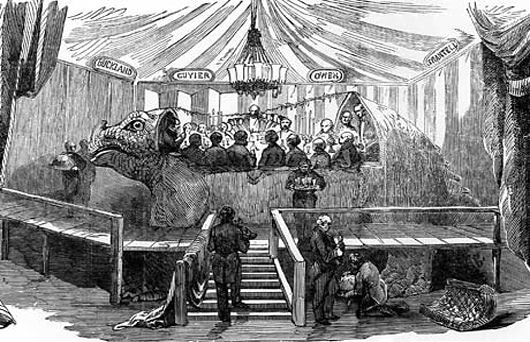What happens when next nature dreams of old nature? Such is the case with extinct animals that have ever come in contact with humans, particularly the dinosaurs, our own postmodern dragons. Creatures that we layer with a fearful wonderment, dinosaurs are a fantastic lost fauna that emerge through hints and half-glimpses, much like the accounts of dragons passed through fragmented texts or embellished traveler's tales. As with dragons, our only knowledge of their behavior emerges from our imaginations.
In the Victorian era, dinosaurs were brutal, ugly creatures, as slow-witted as they were slow-footed. They reflected notions of a grand evolutionary hierarchy that gradually, almost purposefully, gave rise to homo sapiens.
The contemporary dinosaur would be unrecognizable to the Victorian paleontologist. Smaller theropods are now covered in colorful feathers, the tyranosaurus no longer drags its tail but has lost its vicious streak for the bullying lifestyle of a scavenger.
Yet despite the growing scientific accuracy of these depictions, we cannot help but construct narratives based on the shakiest of evidence. The BBC series Walking with Dinosaurs presents elaborate tales involving dinosaur families, rivalries, and tragedies in the classic style of a nature documentary. Here, the fictional depiction of old nature assumes the trappings of objective truth. Who are we - Next Naturists - to object?
Dinosaurs are wholly cultural contructions: their ecosystem is the collective human consciousness. Now, with humans responsible for the earth's 6th great extinction event, we are ensuring many more species a rich, resurrected life within Next Nature.

Hendrik Jan
This reminds me of a quote by Metahaven (Daniel van der Velden and Vinca Kruk) about the role of dragons in the representation of national identity: ‘Heraldic elements found on national coats of arms are visual representations of myth – for example, dragons are realities in national crests even if we know they don’t exist. In the new definition of national identity […] information takes on the role of the dragon’. Metahaven: Uncorporate Identity, p.48 (Lars Müller Publishers, 2010)
Posted on
David Roden
An enjoyable and provocative post, Allison. But the epistemology employed here is, if not flawed, problematic. Applying this argument consistently we would conclude that Ptolemaic cosmology was not talking about the stars and planets we now describe in modern astronomy since it attributed entirely different properties to them. I suppose that's OK if you want to embrace an extreme social constructivism, but this implies an utterly implausible metaphysics of both social and non-social worlds. It's both more plausible - and ultimately more poetic, I think - to hold that things are autonomous with respect to our descriptions of them and that the world does not change along with our theories of it.
Posted on